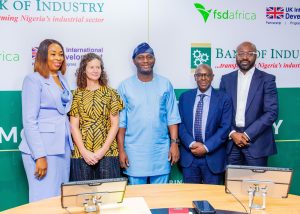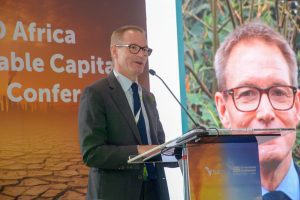Anne-Marie Chidzero, chief investment officer at FSD Africa Investments, talks about the risks and opportunities in backing Africa’s early-stage startups.
While funding is crucial to any startup’s success, Anne-Marie Chidzero knows it’s not the only challenge facing young companies in Africa. Entrepreneurs on the continent navigate problems around policies and regulations and need the backing of investors who can do more than what regular venture capitalists would.
Chidzero, the chief investment officer of FSD Africa Investments, has spent over 20 years in finance and the development of small and medium-sized enterprises (SMEs). In her current role, she identifies and coordinates investment opportunities for the firm. She believes African startups need development finance institutions (DFIs), which provide capital for high-risk projects that traditional lenders are not inclined to fund.
She spoke to Rest of World about how DFIs can bridge Africa’s early-stage startup funding gaps and what the future looks like for the continent’s startup valuations.
In what specific ways do development finance institutions and private investors bridge the early-stage funding gap for startups?
We need [to first] acknowledge why Africa is a frontier market. We have a vast youth population, and we’re seeing that [they] will drive a lot of the innovation around the business models that will address our needs — whether their social or economic needs.
We also need to acknowledge that there’s a massive gap in the market and figure out how to fund these early-stage concepts. Do we have institutions? These are unproven, novel models — they carry many inherent risks. Then, other aspects of the economy have their risks.
The way we intervene is that we are prepared to take a lot of that risk in backing incredible teams, whether they are in the capital market space or early-stage enterprises or startups. We’re ready to support credible teams with real vision and thought-through solutions — particularly solutions driven by technology or digital because that will be very important for Africa’s growth. We’re prepared to come in, potentially unlike other DFIs, to take on that risk. We aim to demonstrate those financing models that we hope will crowd in other DFIs and other types of investors.
How do you see founders and investors adapting to the global tech downturn and its impact on startup funding on the continent in 2023?
The collapse of Silicon Valley Bank (SVB) was less to do with the market they were saving and more to do with their overall growth and how they were financing themselves. It’s important to understand that there certainly is risk in early-stage funding ventures. We are backing a couple of these ventures that are developing innovative solutions. It’s when they get to scale that this needs to be managed. From a financial systems banking perspective, we can learn the lessons from the SVB case. But when it comes down to thinking about those solutions that enable access of early-stage companies to finance, I think we still need to work hard to consider how best to do that, how best to protect the providers, the role of policy and regulation, and so on.
The market is constantly evolving and requires different types of stakeholders to solve problems. And that’s what’s unique about FSD Africa — while we make investments, we’re also conscious that that’s not the only problem that needs to be addressed. There are problems around policies and regulations, raising awareness, and equipping the stakeholders to address the issues in the financial market.
Some investors believe the funding boom between 2020 and early 2022 led to unrealistic valuations. What do you make of this?
Markets are cyclical. Some of those valuations may have been unrealistic. But the market will demonstrate how these valuations materialize, which will impact how investors will view valuations going forward.
I sense that it’s not a market that can self-correct quickly. I think it’s a market that is remarkably resilient. Sadly, we’ll probably have some startups that won’t make it. But it’s a very dynamic market, in my view. I don’t think it’s a question of self-correcting like global markets that can do that because many different players can intervene. In the startup space, there will be quite a lot of resilience. You will see some startups that won’t make it, but you’ll see new ones that will come in.
Read original article




